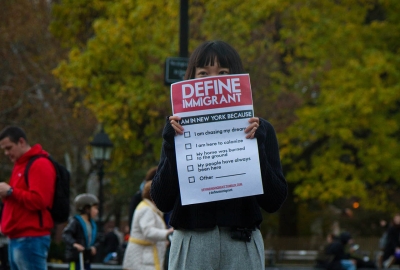
Core Program Modules
These are some of the questions that guide our hands-on investigations through 3 modules, leading to a capstone project:
- What is socially engaged art in the 21st century?
- What is popular education? And, how is socially engaged art a form of popular education?
- How do we understand the public sphere and its relationship to democracy?
- What are the aesthetics, politics, and ethics of socially engaged art?
- How do we know when socially engaged art is effective, toward what ends?
Students take one required foundational course in each program module and then choose electives from across the university each module to customize their degree focus and experiences.
Module 1: Contemporary Artistic Practice
This module addresses the expanding field of socially engaged art in the United States and Internationally. Students engage in examining the history and current practices of socially engaged art and its ideas in relation to the public sphere and democracy. Students will have the opportunities to learn first-hand from socially engaged artists working in public spaces and also in various communities locally and globally.
Module 2: Educational Theory
Providing a firm grounding in popular education and social justice education that is inspired by Paulo Freire, the program envisions the activist artist-educator as one who is able to apply pedagogical practices to diverse artistic endeavors. Students will consider radical educational theory in public, community-based, informal and virtual/media-based contexts, as well as from domestic and international perspectives.
Module 3: Social Activism
Overlaying the artistic and educational modules is a focus on social activism and community engagement. Coursework will explore the history, politics, and ethics of working in local, global, and virtual contexts. Within this module students will learn about methods, tactics, and strategies of engagement from social movements and community organizing to create artistic interventions in public and community spaces.
Electives
Students also choose elective courses from across the university to customize their degree focus and experiences.
Terminal Integrative (Capstone) Project
Working under the supervision of the Program Director and a faculty mentor, students will design and implement a community-based project informed by their individual art practice, their core and elective coursework, and the cultural or organizational context in which they will be working. In collaboration with NYC-based cultural and educational organizations, students will be encouraged to use different methodologies that combine intuition, social, conceptual, and cultural ways of knowing and being in order to develop and implement an art project that allows for social transformation.
Degree Requirements
ARTCR-GE 2461 Art and Ideas: Art & the Practice of Freedom
ARVA-GE 2120 Contemporary Art and Community Museum Partnerships
ARVA-GE 2112 Urban Development in the Visual Arts
ARTED-GE 2015 Race, Education, and the Politics of Visual Representation
ASPP-GT 2028 Performance Matters, Between Imagination and Experience
ASPP-GT 2001 Issues in Art Politics
SOC-GA 2153 Social Movements